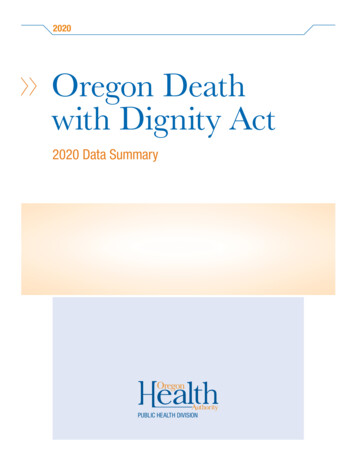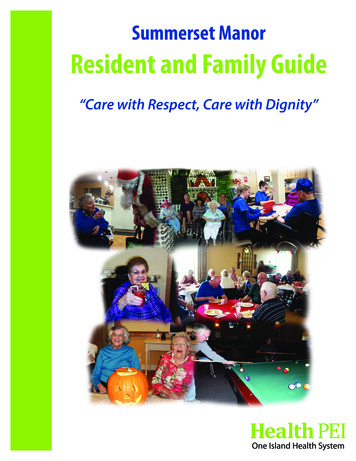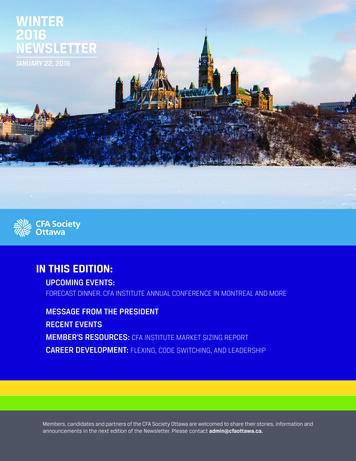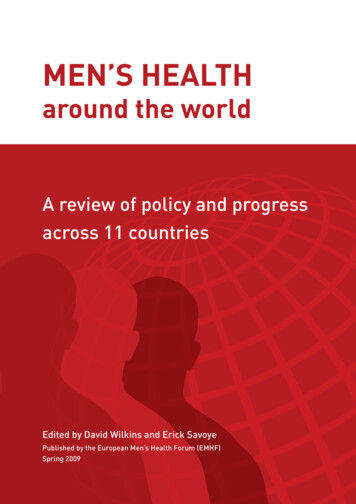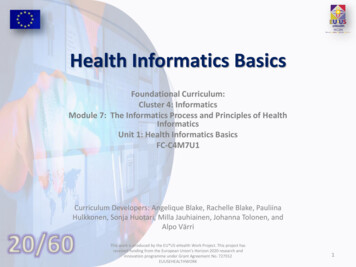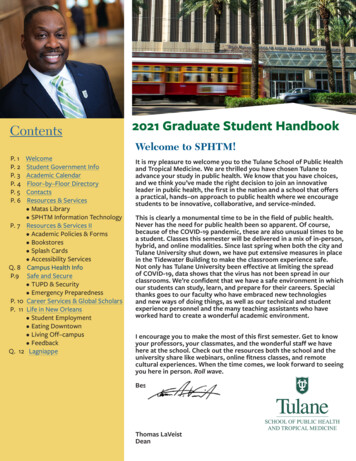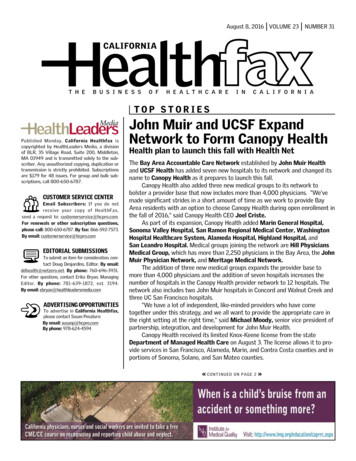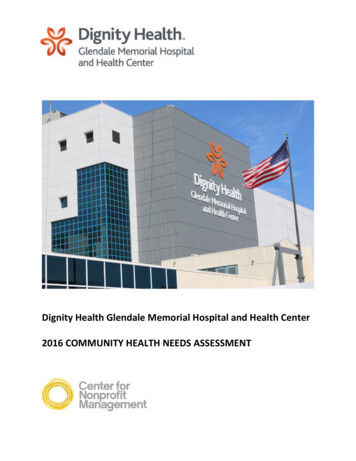
Transcription
Dignity Health Glendale Memorial Hospital and Health Center2016 Community Health Needs AssessmentDignity Health Glendale Memorial Hospital and Health Center2016 COMMUNITY HEALTH NEEDS ASSESSMENT
Dignity Health Glendale Memorial Hospital and Health Center2016 Community Health Needs AssessmentTable of ContentsTable of Contents . iI. Authors and Acknowledgements . 5Authors . 5Acknowledgements . 5II. Executive Summary. 6III. Introduction and Background . 9Purpose of the Community Health Needs Assessment Report . 9Glendale Hospital Collaborative . 9Dignity Health Glendale Memorial Hospital and Health Center (GMHHC) . 10Glendale Adventist Medical Center. 10USC Verdugo Hills Hospital . 10CHNA Consultants . 10IV. Needs Assessment Methodology and Process. 12Secondary Data . 12Primary Data—Stakeholder Feedback . 13Analytical Methods Used To Identify Community Health Needs . 13Data Limitations and Gaps . 14V. Prioritization of Health Needs . 16Community Ranking of Health Needs . 16Analysis of Survey Scores . 17VI. Community Health Profile . 18Service Area Definition . 18Demographic Overview . 22Population . 23Gender . 24Age . 25Race and Ethnicity . 26Language . 28Education . 29Marital Status . 30Household Income . 31Employment Status . 31Income .32Natality 33Births . 33Births by Mother’s Age . 33Births by Mother’s Ethnicity . 34i
Dignity Health Glendale Memorial Hospital and Health Center2016 Community Health Needs AssessmentBirth Weight . 34Breastfeeding . 35Disability . 36Prevalence. 36Special Health Care Needs in Children . 36Mortality . 38Deaths . 38Deaths by Age Group . 38Cause of Death . 39VII. Key Findings—Health Needs 41HEALTH OUTCOMES . 41Alcohol and Substance Abuse and Tobacco Use . 41Alcohol Use . 41Prescription and Illicit Substance Use . 43Alcohol and Drug Treatment . 43Tobacco Use . 43Disparities . 44Stakeholder Feedback . 45Cancer . 45Prevalence. 45Clinical Interventions . 46Screenings . 46Mortality . 47Disparities . 48Associated Drivers of Cancer . 48Stakeholder Feedback . 49Cardiovascular Disease . 49Prevalence and Management . 49Hospitalizations . 50Mortality . 50Cholesterol Prevalence and Management . 51Hypertension Prevalence and Management . 51Hypertension Mortality. 52Disparities . 52Associated Drivers of Health . 54Stakeholder Feedback . 54Communicable and Infectious Diseases . 54Hepatitis B . 54Prevalence. 55Tuberculosis . 55Prevalence. 55Disparities . 56Stakeholder Feedback . 56Diabetes . 56Prevalence and Management . 57Hospitalizations . 57ii
Dignity Health Glendale Memorial Hospital and Health Center2016 Community Health Needs AssessmentMortality . 58Disparities . 59Associated Drivers of Diabetes . 59Stakeholder Feedback . 59Mental Health . 60Prevalence. 60Alcohol‐ and Drug‐Related Mental Illness . 61Hospitalizations . 62Suicide . 63Disparities . 63Associated Drivers of Mental Health . 64Stakeholder Feedback . 64Obesity/Overweight . 64Prevalence. 65Disparities . 66Associated Drivers of Health . 67Stakeholder Feedback . 67Sexual Health / Sexually Transmitted Diseases . 67Prevalence. 68Stroke . 69Prevalence. 70Mortality . 70Associated Drivers of Stroke . 71Stakeholder Feedback . 71HEALTH DRIVERS . 71Access to Healthcare . 71Medicare Beneficiaries . 71Medi‐Cal and Healthy Families Programs . 72Federally Qualified Health Centers . 73Uninsured. 74Lack of Consistent Source of Care. 75Difficulty Accessing Care . 75Health Care Providers . 75Disparities . 76Stakeholder Feedback . 77Alcohol and Substance Abuse and Tobacco Use . 77Dental Care . 78Access. 78Affordability . 79Disparities . 80Associated Drivers of Dental Care . 80Stakeholder Feedback . 81Geriatric Support . 81Overview . 81Preventive Care . 82Falls . 83Osteoporosis . 84Stakeholder Feedback . 84iii
Dignity Health Glendale Memorial Hospital and Health Center2016 Community Health Needs AssessmentHomelessness and Housing . 84Prevalence. 85Associated Drivers. 86Housing . 86Stakeholder Feedback . 87Poverty . 87Disparities . 88Students Receiving Free or Reduced‐Price Meals . .89Preventive Wellness . 90Health Check‐Ups . 90Health Activities . 91Preventable Hospitalizations . 92Disparities . 93Stakeholder Feedback . 94Transportation . 94Personal Transportation . 94Stakeholder Feedback . 95Violence/Injury/Safety . 95Unintentional Injury . 96Teens’ Perception of Injury . 97Stakeholder Feedback . 97VIII. Community‐Specific Trends in Health Care Access . 98IX. Resources Potentially Available to Address Needs .100X. Impact of Actions Taken Since the Preceding CHNA .101Appendix A: Scorecard .104Appendix B: Primary Data Gathering Tools 107Appendix C: Stakeholders .119Appendix D: Data Sources .123Appendix E: Health Needs Profiles .136iv
Dignity Health Glendale Memorial Hospital and Health Center2013 Community Health Needs AssessmentI. Authors and AcknowledgementsAuthorsThe Center for Nonprofit ManagementMaura J. Harrington, Ph.D., MBA, MHarrington@cnmsocal.orgGigi Nang, GNang@cnmsocal.orgHeather Tunis, HTunis@cnmsocal.orgSarah Flores, M.S., SFlores@cnmsocal.orgAdam Wyand, AWyand@cnmsocal.orgChristine Newkirk, CNewkirk@cnmsocal.orgAcknowledgementsThe 2016 Glendale Hospitals Collaborative, composed of Glendale Adventist Medical Center,Dignity Health Glendale Memorial Hospital and Health Center and USC Verdugo Hills Hospital,worked in partnership to conduct this needs assessment.Dignity Health Glendale Memorial Hospital and Health CenterJack Ivie, PresidentRev. Cassie McCarty, Director, Mission Integration & Spiritual Care ServicesGlendale Adventist Medical CenterKevin Roberts, PresidentBruce Nelson, Director of Community ServicesUSC Verdugo Hills HospitalKeith Hobbs, CEOTheresa Murphy, Chief Nursing Officer5
Dignity Health Glendale Memorial Hospital and Health Center2013 Community Health Needs AssessmentII. Executive SummaryThe purpose of this community health needs assessment (CHNA) is to identify and prioritize significanthealth needs of the community served by Dignity Health Glendale Memorial Hospital. The prioritiesidentified in this report help to guide the hospital’s community health improvement programs andcommunity benefit activities, as well as its collaborative efforts with other organizations that share amission to improve health. This CHNA report meets requirements of the Patient Protection andAffordable Care Act (and in California of Senate Bill 697 enacted in 1994) that not‐for‐profit hospitalsconduct a community health needs assessment at least once every three years. As part of the CHNA,each hospital is required to collect and conduct analysis of extensive data from secondary data sourcesas well as input (primary data) from individuals in the community: public health experts; representativesof government and civic organizations; members, representatives or leaders of low‐income, minority,and medically underserved populations and populations with chronic conditions.As in previous years, three Glendale, California hospitals ‐ Glendale Adventist Medical Center, DignityHealth Glendale Memorial Hospital and Health Center and USC Verdugo Hills Hospital – partneredtogether to conduct the 2016 CHNA in collaboration with the Center for Nonprofit Managementconsulting team. During the initial phase of the CHNA process, community input was collected duringfocus groups with key stakeholders, including health care professionals, government officials, socialservice providers, community residents, leaders, and other relevant individuals. Appendix A presents thedata collection tools, and Appendix B lists the stakeholders involved. Concurrently, secondary data werecollected and compared to relevant benchmarks including Healthy People 2020, Los Angeles County orCalifornia when possible. The data were also collected at smaller geographies, when possible, to allowfor more in‐depth analysis and identification of health issues. In addition, previous CHNA reports werereviewed to identify trends and ensure that previously identified needs were not overlooked. Primaryand secondary data were compiled into a scorecard (Appendix C) representing health needs and healthdrivers with highlighted comparisons to the available data benchmarks. The scorecard was designed toallow for a comprehensive analysis across all data sources (Appendix D) and for use during the second,prioritization phase of the CHNA process.Originally introduced in 2013, the 2016 CHNA process included a prioritization process involving afacilitated group session that engaged key community stakeholders in a discussion of secondary andprimary data (compiled and presented in the scorecards and accompanying health need narratives). Atthe session, participants were provided with a brief overview of the CHNA process and a list of identifiedneeds in the scorecard format. In smaller groups, participants considered the scorecards and healthneeds summaries in discussing the data and identifying key issues or considerations that were thenshared with the larger group.As a follow‐up to this discussion, participants and other members of the hospital collaborative’snetwork—including the Glendale Healthier Community Coalition—completed an questionnaire (hardcopy and online) about health needs, drivers, and resources, and ranked each health need according toseveral criteria including severity, change over time, resources available to address the need or driver,and community readiness to support action on behalf of any health need or driver. The survey resultswere used to prioritize the health needs and drivers of health identified in the first session.Dignity Health Glendale Memorial Hospital defines the community for this CHNA as the geographic areaserved by the hospital. GMHHC has primary and secondary service areas, based on a percentage ofhospital discharges. Our primary service area is the basis for our Community Health Needs Assessment.6
Dignity Health Glendale Memorial Hospital and Health Center2013 Community Health Needs AssessmentGMHHC’s primary service is the following 17 ZIP Codes: Glendale (91201, 91202, 91203, 91204, 91205, 91206, 91207, 91208) La Crescenta (91214) Los Angeleso Hollywood: 90026, 90029o Los Feliz: 90027o Griffith Park: 90039o Eagle Rock: 90041o Highland Park: 90042o Glassell Park: 90065o Tujunga 91042Demographics of the primary service area are from Truven Health Analytics data: Population for primary service area: 559,333 Race/Ethnicityo White ‐ Non‐Hispanic: 43.1%o Black/African American ‐ Non‐Hispanic: 1.9%o Hispanic or Latino: 36.3%o Asian/Pacific Islander: 15.9%o All others: 2.8% Median Income: 54,333 Unemployment: 78.1%% No High School Diploma: 20.5% Medicaid Population: 36.1% Uninsured: 7.4% CNI Score: 4.0 Other hospitals serving the area: Glendale Adventist Medical Center and USC‐Keck Verdugo HillsHospital Medically Underserved Area: YesNine health needs and nine drivers of health were identified as priorities through the above‐describedprocess, which will inform the hospital’s community health program focus and strategies for the periodcovering 2016 to 2019. The following full Community Health Needs Assessment provides extensive dataand supportive information regarding the assessment process as well as relevant data and analysis ofthe identified health needs and drivers.Prioritized Health Needs, Separated by Outcomes and DriversRankHealth OutcomesRankHealth Drivers1Mental Health1Homelessness and Housing23456Obesity/Overweight23456Substance AbuseSubstance AbuseDiabetesCardiovascular DiseaseCancer7PovertyAccess to Health CareDental CareViolence/Injury/Safety
Dignity Health Glendale Memorial Hospital and Health Center2013 Community Health Needs AssessmentRank789Health exual Health / STDsHealth Drivers7Preventive Wellness8Geriatric Support9TransportationThe Glendale community has a number of resources from which to draw upon for these variouscommunity needs. For example, the community has the Glendale Healthier Community Coalition, whichmeets regularly to review the top health needs in the community and engages the relevant
health needs of the community served by Dignity Health Glendale Memorial Hospital. The priorities identified in this report help to guide the hospital’s community health improvement programs and community benefit activities, as well as its co

